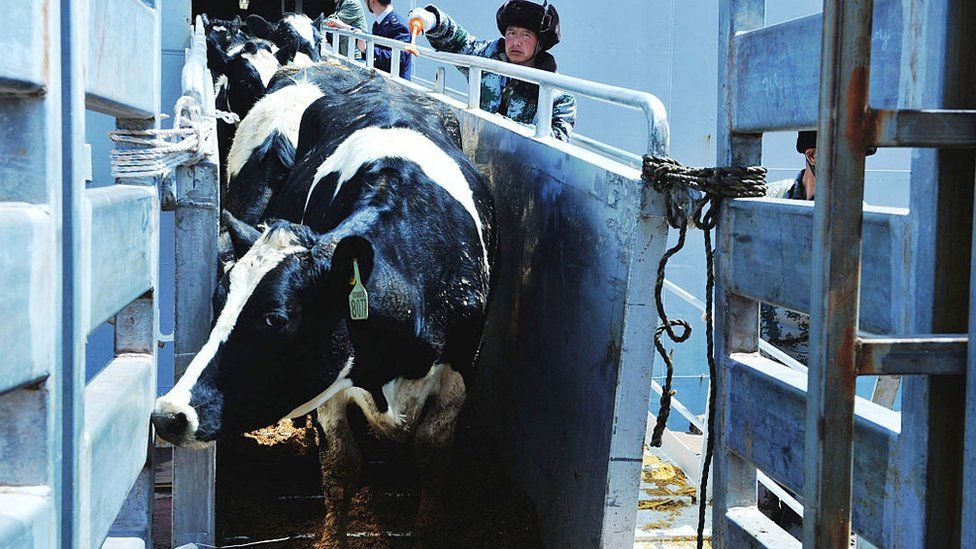Cape Town cattle highlight awful conditions on livestock ships
- Published

Residents of Cape Town woke up to a pungent, sewage-like smell engulfing their neighbourhoods on Monday morning.
The source? A ship from Brazil carrying 19,000 cattle had anchored in the South African port city the night before, in order to reload on animal feed.
After performing an assessment on board the Al Kuwait, staff from a leading animal welfare organisation, the National Council of SPCAs (NSPCA), said the cattle had been on board for two-and-a-half weeks and were living in a "build-up of faeces and ammonia [a gas released from urine]".
Conditions were "awful" and the stench was "unimaginable", the NSPCA said in its statement.
The ship has now left for Iraq but there will still be a funk in the air, campaign groups say.
The cattle are just a fraction of the millions of farm animals that endure lengthy journeys in order to be slaughtered and eaten in another country.
Animal rights organisations have long complained that conditions on board these ships can be hazardous.
They say that, in some cases, creatures have been trampled to death because of overcrowding, while dehydration, disease and hunger are also risks.
Defenders of exporting livestock argue that the practice brings food security to importing nations and also financially benefits farming communities in countries that export.
A handful of casualties have made headlines in recent years, like when more than 40 crew members and almost 6,000 cattle died after a ship sank of the Japanese coast, or when earlier this month a vessel carrying 16,000 sheep and cattle became stranded off the coast of Australia in extreme heat.
Although disasters like these are horrific, "the really bad thing is just the day-to-day suffering" of exported livestock, Peter Stevenson from global animal welfare group Compassion in World Farming (CIWF) told the BBC.
The 19,000 cattle that docked in South Africa are part of a much larger herd of Brazilian exports - in 2022 the South American country sent 150,000 live cattle abroad, CIWF estimates.
Last year, a Brazilian judge outlawed live cattle exports from the country, citing poor welfare practices, but the ban is yet to be imposed.
Australia and the European Union (EU) are also major exporters of livestock, with the latter selling around 4.5 million live farm animals to foreign countries, according to the South African chapter of animal welfare charity Four Paws.
In Africa, Somalia and Sudan export the most. Sudan's authorities said the country exported more than 2.7 million cattle in 2023, despite a raging civil war, according to local media.
But why do countries want to import live animals, rather than chilled or frozen meat?
"There is a traditional belief in many countries... that fresh meat is in some way tastier, healthier than boxed, chilled or frozen meat," Mr Stevenson said.
Some of these nations would struggle to rear animals from birth as they experience arid conditions that have only worsened with global warming.
Australia's LiveCorp, an organisation serving Australia's livestock exporters, and AgForce, which represents Queensland's rural producers, argue that shipping animals contributes to food security in water-stressed regions such as the Middle East.
They also say the export of livestock benefits the Australian economy and farming communities, which can sell their animals for a higher price abroad than they can domestically.
Nonetheless, Australia committed to "phasing out" live sheep exports in 2023. It has not set a deadline, however. Its neighbour New Zealand enforced a ban the same year.
In Europe, Luxembourg has outlawed the trade and the UK is on its way to doing the same - a bill passed through its lower chamber of parliament, the House of Commons, last month. On Wednesday it will be considered by the upper chamber, the House of Lords.
Four Paws notes that as well as hosting a ship full of livestock in its Cape Town port, South Africa exports farm animals itself.
"There is insufficient regulation in place and raising animals in the country simply to be transported to be killed in another means that South Africa bears the harmful impacts associated with animal agriculture while the importing country does not," Fiona Miles, the charity's South Africa director, said.
Not only did the cattle docked in Cape Town cause a nasty stink, they also reminded the world of the risks animals face on the long journeys to our plates.
"Animals are sentient beings and feel pain and stress just like we do," Ms Miles said.